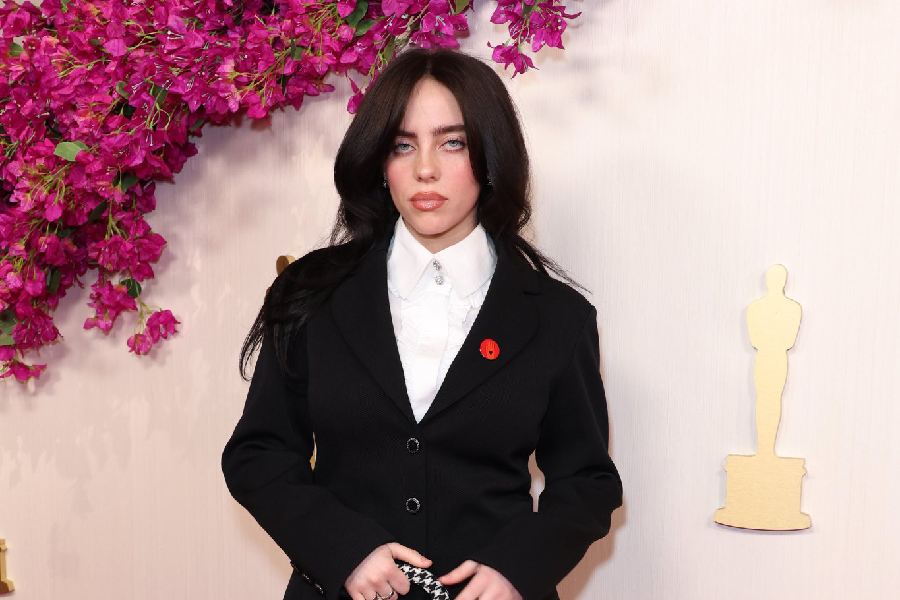Singer Billie Eilish and actor Mark Ruffalo were among the attendees of the Academy Awards on Sunday night who wore red pins calling for a cease-fire in the Israel-Hamas war, a notable exception to an awards season in which many Hollywood stars have been reluctant to draw attention to the conflict.
The pins were provided by Artists4Ceasefire, a group of celebrities and members of the entertainment industry who signed an open letter urging President Joe Biden to call for a cease-fire. The nearly 400 signatories include Bradley Cooper and America Ferrera, who were Oscar nominees this year, as well as Cate Blanchett, Drake and Jennifer Lopez.
“The pin symbolizes collective support for an immediate and permanent cease-fire, the release of all of the hostages and for the urgent delivery of humanitarian aid to civilians in Gaza,” Artists4Ceasefire said in a news release. “Compassion must prevail.”
A handful of entertainers wore the pins Sunday, including director Ava DuVernay, actor Mahershala Ali, comedian Ramy Youssef, and model and actor Quannah Chasinghorse. Eilish and Ruffalo were nominated for televised awards, so their pins were clearly visible during the broadcast.
Each Artists4Ceasefire pin resembles a glossy red quarter, with an image of a hand surrounding a small black heart.
Youssef, a presenter at the ceremony who starred in one of its most-nominated films, “Poor Things,” wore his red pin on the lapel of a black Zegna tuxedo jacket. “There’s a part of you that hopes it doesn’t have to get to pins,” he said in an interview Sunday. “There’s a part of us that hoped we would already be at a cease-fire, and we’re not.”
Youssef said he had been surprised by how few questions he had been asked about the war on red carpets earlier in the season. At the Golden Globe Awards in January, he pivoted a question about Jeremy Allen White’s steamy Calvin Klein ad into an opportunity to call for a cease-fire.
“This isn’t about political strategy, this isn’t about going tit-for-tat,” he said Sunday. “It’s about something really simple, which is just: Hey, let’s stop killing kids.”
The Israel-Hamas war has been a relatively minor presence on red carpets since the Golden Globe Awards in January, when stars including “Succession” actress J. Smith-Cameron wore yellow ribbons to signal solidarity with hostages being held by Hamas.
The Artists4Ceasefire pins have made intermittent appearances at events leading up to the Oscars.
Members of indie rock trio boygenius attached the pins to the lapels of their white Thom Browne suits at the Grammy Awards last month, and actors Tony Shalhoub and Ebon Moss-Bachrach wore the pins on the red carpet at the Screen Actors Guild Awards soon after.
Ruffalo, who was nominated for the Oscar for best supporting actor for his role as a slick suitor in “Poor Things,” also wore one of the red pins to the Directors Guild of America Awards in February.
“We’re not going to bomb our way to peace, and all we’re saying is, what’s wrong with giving a cease-fire a chance?” Ruffalo told Deadline on the DGA red carpet.
More than 30,000 people have been in killed in the Gaza Strip in the war, according to Gaza officials, and about 1,200 people were killed in Israel in the Hamas attack on Oct 7.
Award show red carpets have offered ample opportunities for stars to draw attention to issues of their choosing, although those gestures have sometimes been criticized as hollow. Blue ribbons were the accessory of choice at the 2023 Oscars to voice support for refugees. Women in Hollywood wore black to the Golden Globes in 2018 in solidarity with victims of sexual harassment, and Natalie Portman wore a cape embroidered with the names of female directors to the 2020 Oscars.
As Hollywood stars have become increasingly vocal about political leaders, abortion rights and racial inequality on award show stages, many have remained comparatively quiet regarding the war in the Middle East. That changed slightly at the Grammy Awards last month, where Annie Lennox shouted a call for a cease-fire at the end of her musical tribute to singer Sinead O’Connor.
The Los Angeles Police Department said it was anticipating possible protests related to the Israel-Hamas war on the day of the Oscars, and that it would ramp up security around the Dolby Theater, where the award show is held.
Youssef said that artists played a special role in encouraging viewers to engage with humanitarian issues. “There’s that term ‘talking heads’ — I think artists are talking hearts,” he said. “We’re appealing on an emotional level.”
The New York Times News Service











